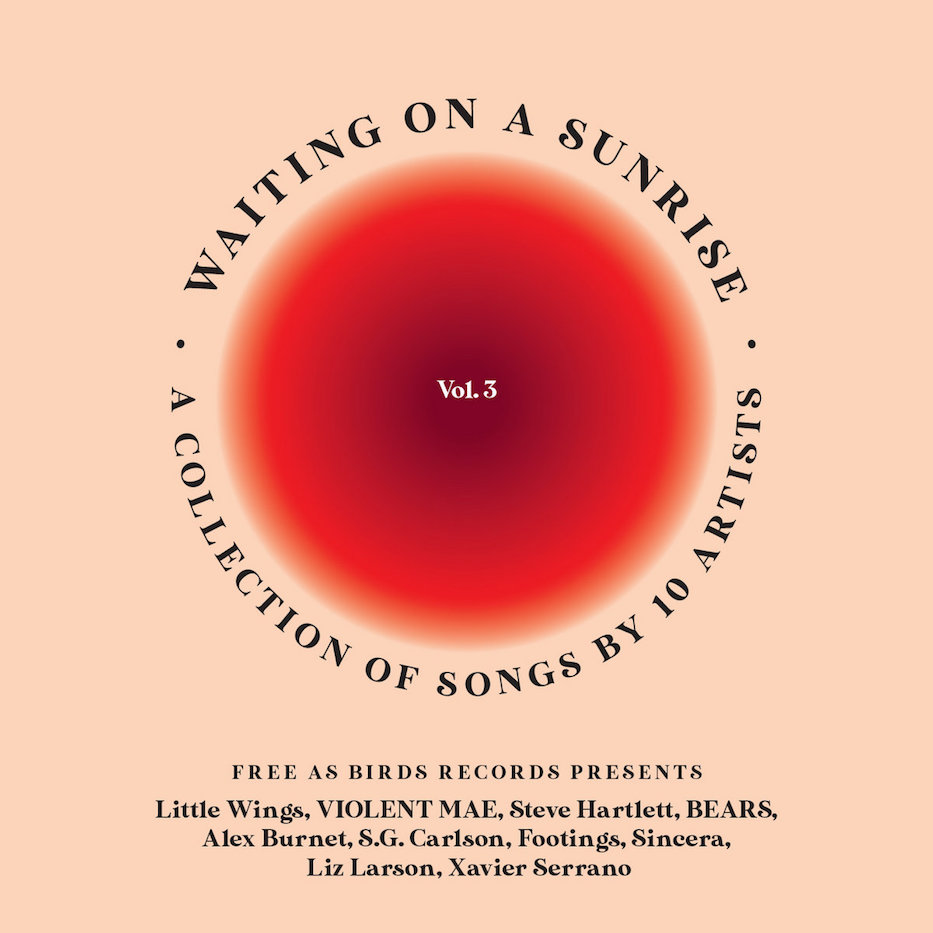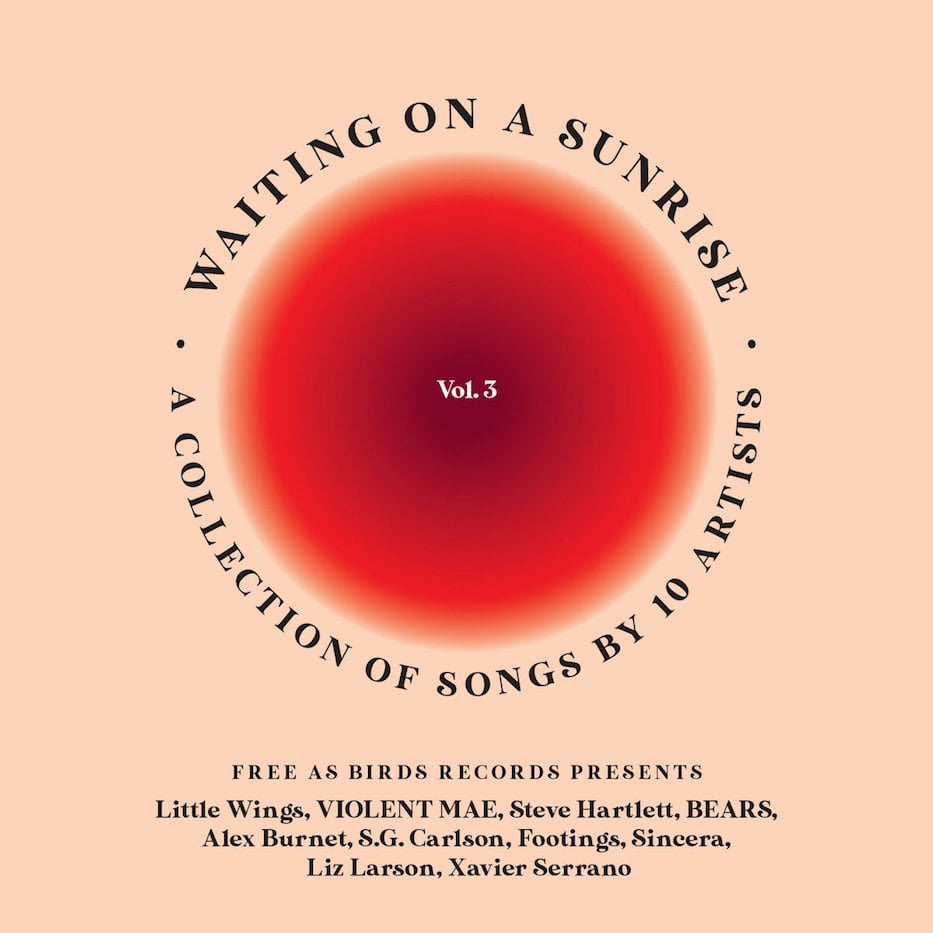
Music | Arts & Culture | COVID-19

| Album Art by Karli Hendrickson. |
The Huntress and Holder of Hands is ready to tear down a doctrine from the source. Long Distance Lover drips with nostalgia. MOONCHA is deep in lockdown, and has been for so many months her voice eases into the well-worn grooves of quarantine itself.
The tone changes: suddenly Alex Burnet cannot stop crying. The band Footings is having a long and lonely night. Xavier Serrano is playing in the end, although no one knows exactly what the end is or when it's coming.
The works come from Waiting On A Sunrise Vol 2 and Waiting On A Sunrise Vol. 3, recorded a month apart, during an eight-week period that included quarantine fatigue, the state-sanctioned murder of George Floyd, new calls to defund the police, and a spike in virus cases tied not to protests, but the slow machinations of late stage capitalism.
Both albums are produced by Free As Birds Records, the brainchild of New Haven musician Alex Burnet, with production help from Sans Serif Recording and album art by Karli Hendrickson. They mark the final installations in a cycle that began earlier this year, with an initial volume that Burnet released in May.
As they track the last months, they become a document of how much can change in just weeks, as a global pandemic magnifies structural racism, economic collapse, and public health disparities that have been obvious to non-white people for years. Proceeds from the second volume went to the Connecticut Bail Fund; proceeds from the third went to the Marsha P. Johnson Institute.
“I'm listening,” Burnet said in an interview between the second and third albums. “I'm still trying to learn my place in this. It's very new, and the scope is huge.”
The shift between the two, both of which warrant listening, is palpable. While Vol. 2 was released June 5, in the thick of both local and national protests for the Black Lives Matter movement, Burnet put out a call out for the material long before that. As a result, it sounds like a postcard from May, which might as well be a lifetime ago.
On the first track, Clenn Plannetts is sweet and soft until he isn’t, spinning the story of his neighbor’s dog as a sort of snapshot of COVID-19. It’s the kind of smart writing that creeps up on the listener: his voice remains calm, sailing over drums and bass even as it becomes clear that the sky is falling. One minute it’s funny—"he just runs back and forth like an asshole,” he sings of the dog—and the next it’s serious.
“The world is on fire/The air tastes like death/There is terror waiting outside the door,” he croons. He pivots to himself as the narrator, wishing that he could be as unaware as his canine friend.
The Huntress and Holder of Hands, which has not released music since 2017, comes in strong with its new “Doctrine,” as even-keeled, muscled vocals come in over lush, steely strings and percussion that feels like a funeral dirge.
The listener cannot not sink into the lyrics: frontwoman MorganEve Swain is hypnotizing as she addresses not only her general audience, but some sort of leader, from whom the titular doctrine is wreaking havoc on society. She weaves nods to religion throughout the song and sings through it with a sense of resolution, vowing to teach tolerance from violence, find order in havoc. It’s a promise to the listener: we’ll get through this.
Other tracks seem to lift and bend the mood instantly, as if they don’t know how to feel from one moment to another. Rudeyna charms the audience with a vocal odyssey that is “One Step More,” where just a few words meet looped and layered vocals, shifting rhythms and bouncy keys and percussion. On another track, J. Russell is soaked in rock as he sings mournfully “I’m so tired of feeling down!” with just a hint of whine in his voice.
Stefanie Clark Harris channels the uncertainty of it all—the coming protests, the country’s complicity in white —as she sings about storm clouds rolling in on the horizon. With heavy electronic beats, MOONCHA channels the exhaustion, confusion, and manic tendencies of lockdown in the eponymously titled track. The bars are so tight that the work feels both sprawling and entirely self-contained.
By the time the second album was released, George Floyd had been murdered in a city street in Minneapolis, and protests had exploded in New Haven. Burnet felt like he was looking at an entirely different world. In an interview between albums, he said he wasn’t sure what to expect from his fellow artists.
“Time's moving really rapidly,” he observed. “Every week is a different month. And people are evolving really quickly to the world around them.”
On the third and final release, time has shifted and settled differently for the album’s 10 artists. For some, there’s a fuller sound; Burnet noted that musicians were back in their studios with more equipment for this album. Others are clearly working through something. BEARS whispers and warbles through “What’d You Wish For,” lyrics swimming in instrumentals. S.G. Carson’s “Guess” feels like a purring sound bath, where it’s okay to crawl right into the lyrics and go back to a different time, where things sounded easier because they were.
But the most intriguing tracks, and the ones that catch a listener and keep them, may be those that engage with the world as it shifts on its axis. In their first release since 2015, Violent Mae holds something heavy when frontwoman Becky Kessler asks “Mama where I can put these feelings down” over hardened, tough but right-on-time strings and keys, like a sort of meditative plea that’s also a prayer. As she keeps going, the listener genuinely feels her question: there's a weight there.
On “Till I Stop Crying,” Burnet appears as himself for the first time in the album series, stepping out from behind the producer’s curtain to deliver the totally candid vocals at which he is best, and has been for years. He counts himself in in a hush, with a performance that feels so intimate the listener might be on his living room floor (except they can't be, because quarantine). The lyrics are mourning something in real time—"till it stops rainin’/it’s gonna pour”—but they feel totally genuine too.
Liz Larson takes a different tack in “Side Of History,” as her voice comes in raw and almost conversational, soaked in fuzz. She doesn’t mince words: the song is a rant and also a search for solutions, jumping from collective liberation to civil rights, gun control and the historic creation of whiteness to justify systems of oppression. “God bless America,” she sings at one point, and it could not be more tongue in cheek.
Xavier Serrano, with whom Burnet performed just before state-enforced closures in March, closes the album with “At The End.” The piece is a treat: Serrano questions everything from the beginning of the song, playing himself in with the lyrics “ooohhhh/how did I get here/apparently/there is a line” over folksy, slow guitar.
It feels like a fitting ending, and also an opening to something new. In an interview earlier this summer, Burnet said he’s working through his own internalized racial biases and relationship with white supremacy. True to his own lyrics, he plans to keep probing it far beyond this project, which he considers finished.
“I keep thinking about this apple tree that I had in my yard in Cedar Hill when I first got here,” he said. “You've probably seen this spiky fungus that grows on the leaves, and it kills the tree. The leaves fall, and the fungus goes into the soil, and the only way to get rid of it is to cut down the tree and get every single leaf and burn all of them.”
“We as a society are the tree right now,” he continued. “And so it's like, how do we get these bad leaves off? The first step in learning is admitting that you don't know.”
Waiting On A Sunrise Vol. 2 and Waiting On A Sunrise Vol. 3 are available for streaming and download at Bandcamp. Listen

